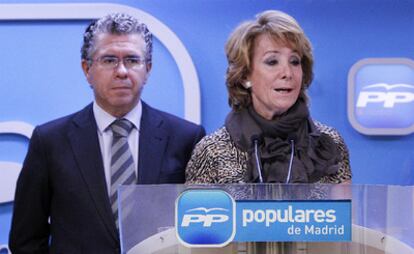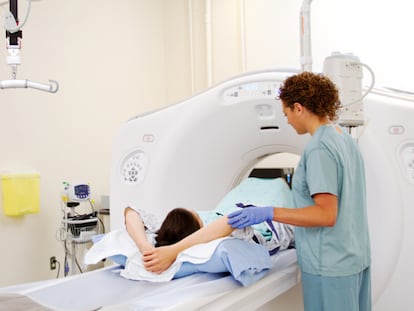The unlucky loser in the Madrid Popular Party's power struggle
Sacked secretary-general was vying with deputy González for premier's trust
Francisco Granados Lerena, 47, was very calm at breakfast on Wednesday. He was having coffee with the mayor of Majadahonda, Narciso de Foxa, and even had time to tweet the event on Twitter. Some hours later, he would be surrounded by journalists at another breakfast — one that he regularly organized a few years back.
According to those who were present, Granados didn't appear nervous or worried at all. Nor did he seem the least bit concerned about Ignacio González, his successor as secretary general of the Madrid Popular Party (PP) and sworn enemy. He either didn't expect he would be fired from the party post he has held since 2004, or apparently, he is a good actor, say those who were present.
What is known is that in the final chapter of the ongoing battle between him and González for the regional premier's trust and confidence, Granados lost.
On Wednesday, during the PP's regional committee meeting, the premier, Esperanza Aguirre, fired Granados from the party top spot, saying she had "lost confidence in him." It was a stunning blow for Granados, who had just learned about his fate about a half-hour before the meeting was to begin.
Aguirre changed the meeting's agenda 15 minutes beforehand and the discussion over her decision only took up about a quarter of an hour of the entire session. There were protests during the tense encounter and, according to one official, about a dozen committee members refused to attend the meeting after they learned about the change in the agenda.
"This is a normal removal of a party secretary general based on the statutes, which state that the regional premier can ask the executive committee for the removal and that's exactly how it happened," Aguirre told reporters afterwards.
Granados' fall from grace actually began in May, following regional and local elections. Aguirre took his job away as interior and justice commissioner, leaving him without a portfolio. She appointed him senator by designation to the regional parliament, a position he still holds.
A financial analyst whose specialty is electric power, Granados began his political career in Valdemoro in 1998, when he became president of the Madrid town's local PP committee. He had worked for a number of companies, including Endesa, Caja Madrid, Ibercaja and Societé General.
In 1999, he became mayor of Valdemoro (population 65,000), and served in that position for four years. He was well liked in the town, mainly because his family was well known. The Socialists' bloc at one point accused him of becoming a "cacique," or political boss with excessive power.
In 2003, Granados was elected as deputy to the regional assembly and became known nationally when he presided over an investigative committee that looked into the facts behind the desertion of two Socialist members during a special vote to select a Madrid regional premier after a hotly contested race. The controversy — in which the two Socialist assembly members refused to enter a pact with the United Left (IU) coalition to ensure a majority for their candidate, Rafael Simancas — paved the way for Aguirre to become regional premier. The Socialists had accused the PP of paying off two of their members so they wouldn't show up for the vote.
In the Aguirre government, Granados was appointed commissioner for infrastructure and transportation. By 2007, he was already serving as Madrid's interior and justice chief and that was when his problems began with González, the deputy regional premier. A reported political espionage scandal broke two years later with allegations that Granados had hired former Civil Guard and ex-police officers to tail party officials González, Madrid Deputy Mayor Manuel Cobo and Alfredo Prada, his predecessor as justice commissioner. Granados has denied the allegations.
Prosecutors investigated the case for two-and-a-half years but decided on two occasions to drop the inquiry. It was reopened this year by the Madrid Provincial Court at the insistence of the Madrid Socialist Party (PSM). Then came other allegations about his finances, trips, and a supposed tailing of González during a visit to Colombia.
Those who know Granados say he was never on Aguirre's good side. "Ignacio is much closer to the regional premier, and never felt that Granados posed any threat," said one of González's closest friends.
Granados likes to treat people as good friends. He is warm, a very big Atlético Madrid fan, and loves to take part in intense discussion about sports. He also adores a microphone, especially his press conferences with reporters. Some years back, Granados organized his "breakfast with the populares," in which he invited journalists to listen to his opinions.
With the PP landslide victory on November 20, Granados had been looking to cement a top position for himself. Over the past few months, he has been trying to make a lot of contacts with top party officials. For now, he remains a deputy and senator at the regional assembly but his name has been popping up as a possible national government delegate for Madrid.

Tu suscripción se está usando en otro dispositivo
¿Quieres añadir otro usuario a tu suscripción?
Si continúas leyendo en este dispositivo, no se podrá leer en el otro.
FlechaTu suscripción se está usando en otro dispositivo y solo puedes acceder a EL PAÍS desde un dispositivo a la vez.
Si quieres compartir tu cuenta, cambia tu suscripción a la modalidad Premium, así podrás añadir otro usuario. Cada uno accederá con su propia cuenta de email, lo que os permitirá personalizar vuestra experiencia en EL PAÍS.
En el caso de no saber quién está usando tu cuenta, te recomendamos cambiar tu contraseña aquí.
Si decides continuar compartiendo tu cuenta, este mensaje se mostrará en tu dispositivo y en el de la otra persona que está usando tu cuenta de forma indefinida, afectando a tu experiencia de lectura. Puedes consultar aquí los términos y condiciones de la suscripción digital.




































































